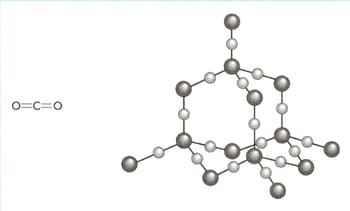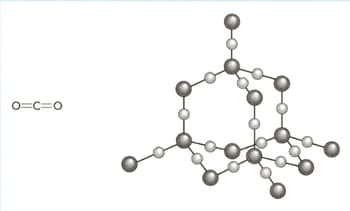The structures of carbon dioxide and silicon dioxide are shown in the diagram below.

Use your knowledge of structure and bonding to explain the following:
silicon(IV) oxide is a solid with a high melting point


Important Questions on States of Matter
The structures of carbon dioxide and silicon dioxide are shown in the diagram below.

Use your knowledge of structure and bonding to explain the following:
neither carbon dioxide nor silicon(IV) oxide conducts electricity.
What do you understand by the term ideal gas?
Under what conditions do a gas not behave ideally? Explain your answer for one of these conditions.
This question is about gases.
Helium is a noble gas. It exists as single atoms. Explain why:
helium has a very low boiling point
Helium is a noble gas. It exists as single atoms. Explain why:
helium does not conduct electricity.
A weather balloon contains 0.500 Kg of helium. Calculate the volume of the gas in the balloon at a pressure of
0.500 × 105 Pa and a temperature of -20.0 °C.
(R = 8.31 JK–1mol–1; Ar He = 4.0)
Water and bromine are both simple molecular substances. Both water and bromine form a lattice structure in the solid-state.
What do you understand by the term lattice?
The boiling point of water is 100°C. The boiling point of bromine is 59°C. Explain the reason for this difference in terms of intermolecular forces.
